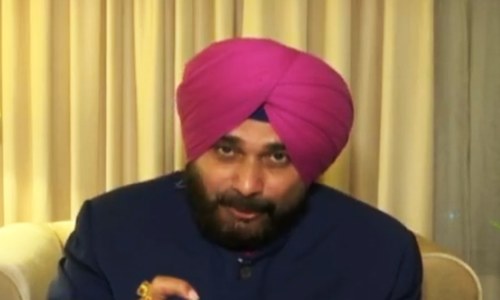• In press conference, military spokesman tells New Delhi: ‘Don’t mess with Pakistan’
• Says pension of ex-spymaster Asad Durrani has been stopped for violation of military code of conduct
• Discloses two army officers have been held for espionage
ISLAMABAD: Army chief Gen Qamar Bajwa, during a visit to the Line of Control (LoC) on Friday, warned India against aggression, saying any misadventure would receive resolute response from his troops.
Gen Bajwa visited the LoC to review the state of preparedness and morale of the troops, a day after the National Security Committee authorised the armed forces to respond to any Indian aggression with full force. The top commander’s visit signalled the highest level of preparedness to the adversary.
War hysteria in India in the aftermath of last week’s attack on Indian security forces in occupied Kashmir’s Pulwama area has led to fears that India may undertake military action to deflect public attention from internal problems.
Read: 'World needs to dissuade India from its war-mongering after Pulwama'
Speaking to the troops on the frontlines in Chirikot and Bagsar sectors, Gen Bajwa said: “Pakistan is a peace-loving country but we will not be intimidated or coerced. Any aggression or misadventure shall be paid back in same coin”.
Meanwhile, military spokesman Maj Gen Asif Ghafoor, while addressing a press conference at the Inter-Services Public Relations office, said in case India started aggression against Pakistan it would be surprised by the level of response it would get from the Pakistani armed forces.
In a message directed at Indian military planners, the spokesman said: “Be rest assured, should you initiate any aggression. First, you shall never be able to surprise us. We are ready. In response we shall for sure surprise you.”
Talking of deployment at forward locations, Gen Ghafoor said Pakistani troops “shall have superior force ratio at decisive points”. He cautioned the Indian army against underestimating Pakistani defence, saying: “Never think that we shall fall short of capacity. … We have the ways and means for the end state.”
He said Pakistani armed forces were “ready to respond to full spectrum threat” and in the event of Indian aggression, “shall dominate the escalation ladder”.
Emphasising unity within the country, the military spokesman said: “We have singleness of conception all across from PM to a common citizen, including all political parties and other segments of society from our chiefs down to soldiers. We have the will and the determination.”
His message for the Indian side was “don’t mess with Pakistan”.
He said that Pakistan’s military capabilities were India-specific and the troops were battle-hardened after a long fight against terrorism.
Questioning Indian allegations of Pakistani state’s involvement in the Pulwama attack, the general said that the timing of the strike showed the other side had tried to benefit from it. He maintained that a closer look at the events and circumstantial evidence, including the vehicle and explosives used in the attack, proved that Pakistan was not involved. He also called for analysis of the video in which the attacker claimed responsibility.
“Pattern of attacks shows that whenever in Pakistan there is some important event due, some staged action of this sort takes place,” the spokesman noted.
He further said: “The attack took place miles away from LoC. The explosives used in the attack were not from Pakistan. The car used was not from Pakistan either. The attack was carried out by a youngster from occupied Kashmir who was mistreated by Indian security forces.”
Maj Gen Ghafoor said unlike India which unleashed allegations soon after the attack, Pakistan denied the allegations of its involvement after conducting its investigations. “We are responding to India as a responsible state,” he said and recalled that Prime Minister Imran Khan’s statement on the escalation made an unprecedented offer to India by proposing dialogue on terrorism and other outstanding matters and offering cooperation in investigation of the attack.
Asad Durrani
Maj Gen Ghafoor, sharing an update on the investigation against former Inter-Services Intelligence chief retired Lt Gen Asad Durrani, said that he had been found guilty of violating the Military Code of Conduct and accordingly punished.
“His pension has been stopped immediately and we are working with the Ministry of Interior over whether or not to keep him on Exit Control List,” he said.
Gen Durrani had collaborated with former Indian top spy A.S. Dulat in a book project. The book titled The Spy Chronicles: RAW, ISI, and the Illusion of Peace contains conversations between Gen Durrani and Dulat mediated by an Indian journalist. The two former spies had in the book touched upon some of thorny issues that kept Pak-India ties strained for decades, at times pushing them to the brink of war. These issues included terrorism, particularly Mumbai attack, Kashmir, spy wars and the influence of defence bureaucracies in the two neighbouring countries.
Gen Durrani was later tried for violation of the military code of conduct which is applicable on all serving and retired military personnel. Section 55 of the Military Law, which relates to “conduct unbecoming of an officer” is considered to have a very wide scope.
The military spokesman further disclosed that in another case, two Army officers had been taken into custody on the allegations of espionage and Army Chief Gen Qamar Bajwa had ordered a field general court martial against them.
The military spokesman, responding to a question about angry statements made by some Iranian officials after the attack on a Revolutionary Guards bus, said Pakistan and Iran had brotherly ties, which would further improve.
“We are discussing with Iran fencing of the border so that that no one can misuse the space,” he said.
Pakistan and Iran share over 900-km-long border which is infested with criminal gangs, militants and drug traffickers. Some of the groups have in the past carried out cross-border attacks killing Iranian border security forces. Therefore border security has for long remained a major irritant in bilateral ties.
Published in Dawn, February 23rd, 2019















































